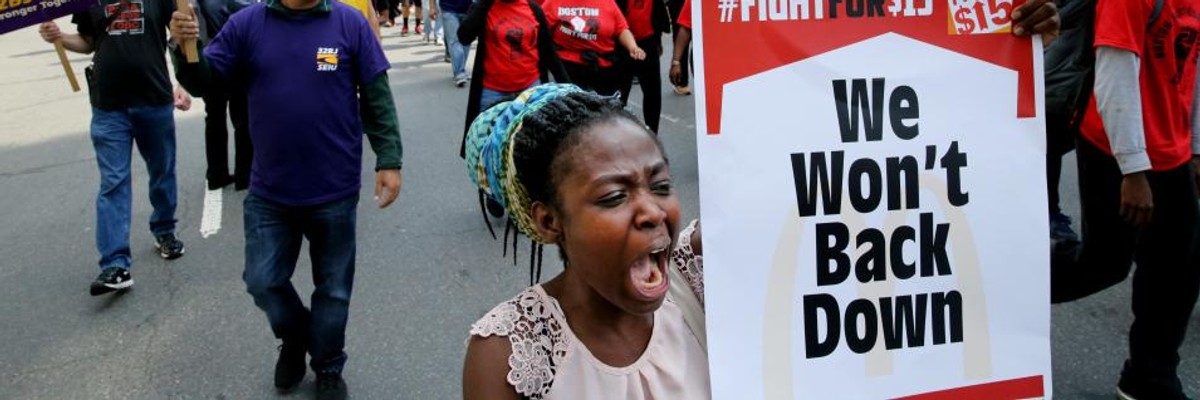The federal minimum wage has been stuck at $7.25 an hour for more than a decade due to continued inaction by Congress, but a record 72 jurisdictions across the U.S. are raising their minimum wage floors in 2020 in response to grassroots pressure led by the Fight for $15 movement.
That's according to a report released Monday by the National Employment Law Project (NELP), which found that of the 72 total states, cities, and counties raising their minimum wages in 2020, 32 of them will reach or surpass $15 an hour at some point in the new year.
"We're seeing an unprecedented number of states, cities, and counties raise the minimum wage."
--Yannet Lathrop, National Employment Law Project
Yannet Lathrop, researcher and policy analyst with NELP and author of the new report (pdf), said the wage hikes around the nation are evidence of "the incredible momentum that the Fight for $15 movement has built up."
"We're seeing an unprecedented number of states, cities, and counties raise the minimum wage," Lathrop said in a statement. "Local communities all around the country strongly support raising the minimum wage, because people see their friends, neighbors, or themselves working hard but not getting ahead. People who work low-wage jobs need and deserve a raise--and companies can afford it. There's no excuse."
NELP found that 21 states and 26 cities and counties--including Illinois; Denver, Colorado; and Saint Paul, Minnesota--will hike their minimum wages on or around New Year's Day, bringing much-needed raises to hundreds of thousands of low-wage workers struggling to stay afloat amid soaring living costs.
"The continued success of the Fight for $15 movement, demonstrated once again by the record number of jurisdictions set to increase their minimum wage rates in 2020, shouldsuggest to any lawmakers who continue to resist raises that their opposition is futile," said NELP.
Despite nationwide progress, NELP found that around 346,000 workers in a dozen cities and counties will not see the benefits of higher wages due to state laws invalidating local minimum wage increases.
According to the report, state legislatures in Alabama, Kentucky, Florida, Iowa, Missouri, and Wisconsin have preempted local minimum wage increases, depriving workers of an estimated $1.5 billion in wages each year.
"Let's be clear: Wage preemption is a racial and gender justice issue," Rebecca Dixon, NELP's incoming executive director, said in a statement. "Most of the workers affected by these state laws blocking local wage increases are women. And workers of color make up the overwhelming majority of affected workers in Birmingham, St. Louis, and Miami Beach, while constituting a sizable share of the affected workers in many of the other cities."
"These preemption laws are depriving workers of badly needed wages they have already fought for and won," Dixon added. "We know workers and advocates will not accept these unjust laws that take away local control and nullify local democracy."

